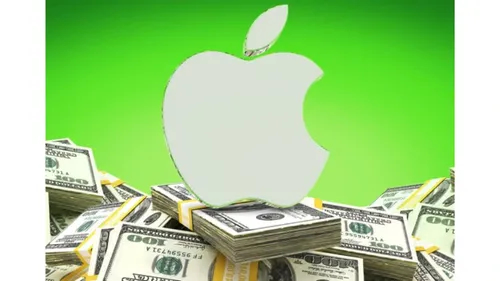Ad
Articles
Apple CEO's $50 Million Stock Sale: Implications for Investors and Market Trends

In the world of finance, insider trading activity can often raise eyebrows. Recently, Apple Inc.'s CEO, Timothy Cook, sold over $50 million worth of company stock. Such transactions are closely watched by investors and analysts, as they can provide insights into executive sentiment and company performance. This article will break down the details of Cook's stock sales, the broader context of Apple’s performance, and what this means for consumers and investors alike.
Who is Timothy Cook?
Timothy Cook has been the CEO of Apple since 2011, succeeding the late Steve Jobs. Under his leadership, Apple has continued to innovate and expand its product line, contributing to its status as one of the most valuable companies in the world. Cook’s decisions, including those regarding his stock holdings, can significantly impact public perception and investor confidence.
Details of the Stock Sale
On October 2, 2024, Timothy Cook sold a total of 171,046 shares of Apple common stock. The sales were made at prices ranging from $223.75 to $226.57 per share, resulting in a total value of approximately $50.3 million. These transactions were conducted under a pre-arranged Rule 10b5-1 trading plan. This type of plan allows company insiders to sell stocks at predetermined times, helping them avoid accusations of insider trading.
Restricted Stock Units (RSUs)
In addition to selling shares, Cook also received 477,301 shares through the vesting of Restricted Stock Units (RSUs). However, to satisfy tax withholding obligations, Apple withheld 253,315 shares. This practice is common among executives who receive stock as part of their compensation package. After these transactions, Cook's direct ownership of Apple stock stands at approximately 3,280,180 shares.
A restricted stock unit (RSU) is a form of stock-based compensation granted by an employer. It includes a vesting period during which the RSU does not hold any monetary value. Once the RSU vests and converts into actual common stock, the holder is subject to taxes based on its value. Generally, RSUs are considered more favorable than stock options.
Why Do Executives Sell Stock?
Diversification: Selling stock allows executives to diversify their investment portfolios, reducing risk. Liquidity Needs: Executives may need cash for various personal reasons, such as purchasing a home or funding a child's education. Planned Sales: Rule 10b5-1 plans are established to schedule sales ahead of time, reducing the risk of insider trading allegations.
Market Context

Apple’s Recent Performance
Apple Inc. has been experiencing solid growth in its App Store revenues, which increased by 14% in September. This surge is attributed to strong performance in key markets like China and Japan, positioning the company for continued growth in its Services revenue segment. Analysts at Evercore ISI and BofA Securities maintain positive ratings on Apple, highlighting steady iPhone 16 shipping times and potential improvements to gross margins.
Stock Market Sentiment
Despite the recent stock sales by Cook, analysts have remained optimistic about Apple's future. For instance, JPMorgan has reiterated its Overweight rating on Apple’s stock, forecasting a robust product cycle for the iPhone 16 series. This indicates a level of confidence in Apple's long-term prospects, despite any short-term fluctuations in stock price.
Understanding Stock Metrics
Apple’s Market Capitalization As of the latest reports, Apple boasts a market capitalization of approximately $3.42 trillion, making it one of the most valuable companies globally. This figure is crucial for investors, as it reflects the total value of the company's outstanding shares.
Price-to-Earnings (P/E) Ratio Apple’s P/E ratio stands at 33.88, suggesting that investors are willing to pay a premium for the company's earnings. This high valuation could be a factor in Cook's decision to sell shares, as it presents an opportunity to capitalize on strong market performance.
Revenue and Profit Margins Apple's revenue for the last twelve months reached $385.6 billion, showing a slight growth of 0.43%. The company also maintains a robust gross profit margin of 45.96%, reflecting its ability to command premium prices for its products. This financial strength underlines Apple's stability and capacity for future growth.
Implications for Consumers and Investors Monitoring Insider Activity Investors often keep a close eye on insider transactions, as they can provide insights into executives' perspectives on the company's stock value. While Cook's stock sales could raise questions about his confidence in Apple’s future, it's essential to recognize that such transactions are often part of broader financial planning and compensation strategies.
Dividend Stability Apple has a strong history of raising its dividend for 12 consecutive years, indicating financial stability and a commitment to returning value to shareholders. With a current dividend yield of 0.44%, this consistent growth in dividends may appeal to long-term investors seeking income in addition to capital gains.
Potential Risks While Apple appears to be on solid footing, potential risks loom on the horizon. The National Labor Relations Board (NLRB) has filed a complaint against Apple, accusing the company of implementing workplace rules that may interfere with employees' rights to organize. Additionally, recent disruptions in the supply chain due to a fire at a Tata Group facility in Tamil Nadu may impact production timelines for iPhone components. Investors should remain vigilant regarding these developments.
Understanding Insider Trading

Insider trading refers to the buying or selling of a company's stock by individuals who have access to nonpublic, material information about the company. This can include executives, employees, or anyone with privileged information. Insider trading can be classified into two categories:
- Legal Insider Trading: This occurs when company insiders buy or sell stock and report their trades to the appropriate regulatory bodies, such as the Securities and Exchange Commission (SEC) in the U.S. These transactions are typically executed under plans like Rule 10b5-1, which help ensure compliance with securities laws.
- Illegal Insider Trading: This involves buying or selling stock based on material information that has not been disclosed to the public. Engaging in illegal insider trading is considered a serious offense and can lead to significant legal penalties, including fines and imprisonment.
Why Insider Trading Matters
Insider trading is closely monitored because it can undermine investor confidence and distort the fairness of the financial markets. When insiders trade based on nonpublic information, it creates an uneven playing field, disadvantaging ordinary investors who do not have access to the same information.
Regulatory Framework in the USA
In the United States, insider trading is primarily regulated by the Securities and Exchange Commission (SEC), which enforces laws designed to prevent and penalize the misuse of nonpublic information. Below are the key components of the regulatory framework:
-
Securities Exchange Act of 1934 The foundation of insider trading regulation in the U.S. stems from the Securities Exchange Act of 1934. This act prohibits insider trading and provides the SEC with the authority to enforce rules against it. Section 10(b): This section makes it unlawful to use any manipulative or deceptive device in connection with the purchase or sale of securities. It serves as the basis for many insider trading prosecutions. Rule 10b-5: Implemented under the 1934 Act, this rule prohibits fraudulent activities in connection with the purchase or sale of securities, including insider trading.
-
Insider Trading and Securities Fraud Enforcement Act of 1988 This act strengthened the SEC’s ability to combat insider trading by increasing penalties for violations and enhancing enforcement capabilities. Key points include: Increased Penalties: It established civil penalties of up to three times the profit gained or loss avoided through insider trading. Criminal Penalties: Individuals found guilty of insider trading can face criminal charges, including imprisonment and substantial fines.
-
Regulation FD (Fair Disclosure) Adopted in 2000, Regulation FD aims to eliminate selective disclosure by publicly traded companies. It requires that any material information be disclosed to all investors simultaneously, thereby reducing the opportunity for insiders to profit from nonpublic information.
-
Reporting Requirements for Insiders Insiders, including executives, directors, and certain shareholders, are required to report their trades to the SEC: Form 4: Insiders must file this form within two business days of a transaction involving their company's stock. Form 13D: This form is required for anyone acquiring more than 5% of a company’s shares, ensuring transparency in ownership changes.
-
Enforcement and Prosecution The SEC actively monitors trading activities to detect suspicious patterns indicative of insider trading. It has the authority to conduct investigations and impose civil penalties. Additionally, the Department of Justice (DOJ) may pursue criminal charges in severe cases. Recent Cases: High-profile insider trading cases, such as those involving Martha Stewart and Raj Rajaratnam, have highlighted the SEC's commitment to enforcing insider trading laws.
-
Legal Defenses Individuals accused of insider trading may raise certain defenses, such as demonstrating that the information was publicly available or that they did not act with intent to defraud. However, the burden of proof lies with the accused.
Regulatory Framework in India
In India, insider trading is primarily governed by the Securities and Exchange Board of India (SEBI), which enforces regulations to prevent and penalize insider trading activities. Below are the key components of the regulatory framework:
- SEBI (Prohibition of Insider Trading) Regulations, 2015 These regulations were established to prohibit insider trading and provide a framework for dealing with material non-public information (MNPI). Key aspects include:
- Definition of Insider: An insider is defined as any person who is connected with the company and has access to unpublished price-sensitive information (UPSI).
- Materiality: Information is considered "material" if it is likely to have a significant impact on the price of a security.
- Prohibition on Trading: Insiders are prohibited from trading in securities when in possession of UPSI. This applies not only to corporate executives but also to employees, directors, and other individuals who may have access to such information.
- Trading Plans: The regulations allow insiders to create trading plans, which specify the timing and volume of trades in advance, helping to mitigate allegations of insider trading.
-
Disclosure Requirements Pre-emptive Disclosure: Companies are required to disclose UPSI to the public to ensure transparency. This includes the obligation to announce any price-sensitive information that may affect the stock price. Reporting Obligations: Insiders must report their trades to the stock exchanges and the company. The details must be filed within two working days of the trade.
-
Enforcement and Penalties Investigative Powers: SEBI has the authority to investigate suspected insider trading cases and can impose penalties for violations. This includes monetary fines and, in severe cases, imprisonment. Penalty Framework: Under the SEBI regulations, individuals found guilty of insider trading can face penalties ranging from fines to a maximum of three times the profits made or losses avoided as a result of insider trading.
-
Role of Stock Exchanges Stock exchanges in India, such as the Bombay Stock Exchange (BSE) and the National Stock Exchange (NSE), play a crucial role in monitoring trading activities. They are responsible for enforcing compliance with SEBI regulations and reporting suspicious transactions.
-
Recent Developments The SEBI continually updates its regulations to enhance transparency and strengthen the enforcement of insider trading laws. Recent amendments have included stricter disclosure norms and more comprehensive definitions of what constitutes UPSI.
The Role of Rule 10b5-1
Rule 10b5-1 allows company insiders to establish predetermined trading plans that specify the timing, price, and amount of shares to be bought or sold. By adhering to this rule, insiders can avoid accusations of insider trading while benefiting from the ability to manage their stock holdings. The rule is designed to promote transparency and reduce the potential for abuse by ensuring that trades are made without the influence of undisclosed material information.
Implications for Investors
Investors often scrutinize insider trading activity as it can provide insights into executives' confidence in their company's future performance. Legal sales of stock by insiders may signal their belief in the company's strength, while a pattern of selling may raise concerns about potential challenges ahead. However, it’s important to consider the context of these transactions, including factors such as the reason for the sale (e.g., personal financial needs or diversification).
Conclusion
Timothy Cook’s recent sale of over $50 million in Apple stock highlights the complexities of insider trading and executive compensation. While such actions may raise questions, they are often part of planned financial strategies. Meanwhile, Apple continues to show strong performance metrics, a solid market position, and a positive outlook from analysts. For consumers and investors, understanding the intricacies of these transactions and the broader market context can help inform better decision-making. By keeping an eye on insider activity, market trends, and potential risks, individuals can better navigate the landscape of stock investments, particularly in a company as prominent as Apple.
Investing in stocks involves both risks and rewards, and it’s essential to stay informed. As Apple continues to innovate and grow, the actions of its executives, such as Timothy Cook, will undoubtedly influence market perceptions. Being informed about these dynamics can empower consumers and investors to make smarter financial choices.
Follow Us:
Ad
Recent News

Realme Narzo 90x 5G Goes on Sale in India Today
23-Dec-2025 06:59 AM

Samsung Unveils Exynos 2600, the World's First 2 nm Chipset
19-Dec-2025 06:30 AM

Google Unveils Gemini 3 Flash: Faster AI That Outshines Pro Model
18-Dec-2025 09:55 AM

Motorola Edge 70 Launches in India: Slim Design, Strong Battery
15-Dec-2025 07:14 AM

Jio’s Happy New Year 2026 Plans: Get Unlimited 5G and more
15-Dec-2025 06:38 AM
Reviews & Guides
View All

Nothing Phone 3a Community Edition First Impressions: A Fresh Take on Budget Smartphones

Realme P4x 5G Review: Budget-Friendly Beast with Epic Battery Life

Sony BRAVIA 7 Mini LED K-65XR70 vs. Haier Mini LED H65M95EUX

Samsung QN90F (65QN90FAU) Review: The King of Bright-Room Viewing

Why doesn’t Apple reveal the iPhone battery in advertisements?

Donald Trump Watch Collection: Timeless Luxury on the Wrist

Best 5 Litre Water Heaters in India 2025: Top Latest Models for Quick Hot Water

Top 10 camera lenses you should Own in 2025
Ad
Latest Mobiles In India
Ad
Ad












